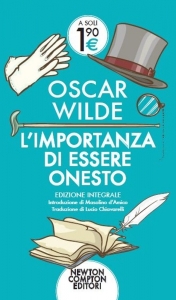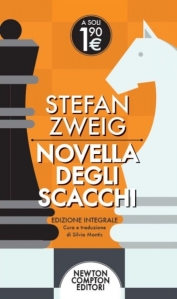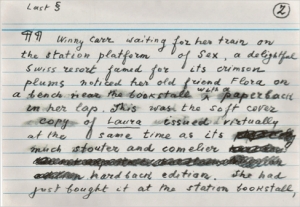So, you haven’t heard from me (Robbie) in a while, because I’ve been on holiday, but that doesn’t mean I wasn’t seeking out interesting gobbets of information to feed you with, one of which to follow. I’ve also got reviews up my sleeve for a whole plethora of books, including Evie Wyld’s debut novel, Judith Schalansky’s The Giraffe’s Neck, and the 1180 page epic tome by Michael Schmidt, The Novel, A Biography (I admit, I haven’t read it all yet, but I will make that clear) and many others that I can’t bring to mind at this moment. For now, though, let me tell you about an Italian publisher who is doing something rather special.

There are a lot of sea urchins in Italy (I think this is a different species, however)
Whilst I was on my version of the Italian Grand Tour (going to as few places as possible, and only if they are very quiet) I came across a bookshop, and being of a mothlike bookish persuasion I was drawn inescapably in, even though I struggle to find enough Italian to ask for a glass of white wine. Inside I saw a lot of books, some of which I liked the look of and some that I didn’t, but one particular imprint caught my eye for three reasons: they were brightly-coloured enough for my sun befuddled eyes to be able to see them clearly, they were by ‘canonical’ authors I could recognise easily, and they were cheap. Seriously cheap, and for reasons I will go into in the following paragraph-but-one I will tell you why this is praiseworthy, and why it should be held up as an example to the publishers of so-called classic literature in this country. But before I do that I should give you a picture of one of these books, because so far all I’ve given you is a sea urchin, and tell you a bit about the publisher (I only know a bit).
 Newton Compton Editori may not seem like the most Italian of names (without the helpful Editori, anyway) but it is Italian through and through, having been started by a Vittorio Avanzini in Rome in the 60s. NC is primarily interested in publishing classic fiction, but have recently moved into contemporary translations, which we thoroughly approve of. They produce two forms of Classic – their paperback, which sells at 1.90€ (about £1.50) and a hardback (3.90€ // £3.10). They have only just put up the prices on their paperbacks, so if you fly out quick you can still swipe copies for only 99 cents (like I did).
Newton Compton Editori may not seem like the most Italian of names (without the helpful Editori, anyway) but it is Italian through and through, having been started by a Vittorio Avanzini in Rome in the 60s. NC is primarily interested in publishing classic fiction, but have recently moved into contemporary translations, which we thoroughly approve of. They produce two forms of Classic – their paperback, which sells at 1.90€ (about £1.50) and a hardback (3.90€ // £3.10). They have only just put up the prices on their paperbacks, so if you fly out quick you can still swipe copies for only 99 cents (like I did).
 The reason I feel like this is noteworthy is that these books are not poorly made, are not going to discolour in a week (I’m looking at you, £2 Penguin Popular Classics). I tested my paperback copy of Bulgakov’s Cuore di Cane in Italy by leaving it in the baking sun whilst taking my siesta, holding it in my armpit whilst walking along the sea wall of the port, and it also spent quite some time lightly folded over in the bottom of my bag on the flight home, where it came out looking pretty healthy. What I am alluding to here is that Classic can be cheap (more on this in a moment) and well made, because you will sell hunners of them so they can be printed in bulk, which reduces the cost of production massively.
The reason I feel like this is noteworthy is that these books are not poorly made, are not going to discolour in a week (I’m looking at you, £2 Penguin Popular Classics). I tested my paperback copy of Bulgakov’s Cuore di Cane in Italy by leaving it in the baking sun whilst taking my siesta, holding it in my armpit whilst walking along the sea wall of the port, and it also spent quite some time lightly folded over in the bottom of my bag on the flight home, where it came out looking pretty healthy. What I am alluding to here is that Classic can be cheap (more on this in a moment) and well made, because you will sell hunners of them so they can be printed in bulk, which reduces the cost of production massively.  Right, cost. I have talked about this in passing before, but this gives me the opportunity to have a good rant. For many of the cannonical classics there is no living author, and often no rights either. Thus, if I wanted to, I could typeset, print, bind and sell a copy of Great Expectations tomorrow and wouldn’t have to pay anyone (If I did all the production). So how is it that companies (Cambridge Modern Classics and Penguin Classics being the big players here) can rationalise a £9.99 price tag (going all the way up to around £17 in some cases) for a book where there is no advance or royalty needing covered?
Right, cost. I have talked about this in passing before, but this gives me the opportunity to have a good rant. For many of the cannonical classics there is no living author, and often no rights either. Thus, if I wanted to, I could typeset, print, bind and sell a copy of Great Expectations tomorrow and wouldn’t have to pay anyone (If I did all the production). So how is it that companies (Cambridge Modern Classics and Penguin Classics being the big players here) can rationalise a £9.99 price tag (going all the way up to around £17 in some cases) for a book where there is no advance or royalty needing covered?
 Now of course, occasionally you will change the cover, or order a new translation, or even deign to actually pay an academic to write a forward, but largely these texts haven’t changes for decades. Just imagine the money being taken, and (in my opinion) taken unfairly.
Now of course, occasionally you will change the cover, or order a new translation, or even deign to actually pay an academic to write a forward, but largely these texts haven’t changes for decades. Just imagine the money being taken, and (in my opinion) taken unfairly.
 I would like to hear any defense of the extortionate prices involved for out of copyright text, so if you have one please let me hear it. I have heard it said that a cheap classic will put people off buying modern fiction, but it just doesn’t wash with me, because what is on offer is a completely different experience.
I would like to hear any defense of the extortionate prices involved for out of copyright text, so if you have one please let me hear it. I have heard it said that a cheap classic will put people off buying modern fiction, but it just doesn’t wash with me, because what is on offer is a completely different experience.
 I’m just on the train back from a very interesting (if you are a publisher) Q&A session with James Daunt of Daunt Books and Waterstones (I really miss that apostrophe) fame. In it I learnt three things that got me thinking about the way that we, as publishers, approach publishing, and have come to the conclusion that we may be doing it Poorly.
I’m just on the train back from a very interesting (if you are a publisher) Q&A session with James Daunt of Daunt Books and Waterstones (I really miss that apostrophe) fame. In it I learnt three things that got me thinking about the way that we, as publishers, approach publishing, and have come to the conclusion that we may be doing it Poorly.
















 Right, cost. I have talked about this in passing before, but this gives me the opportunity to have a good rant. For many of the cannonical classics there is no living author, and often no rights either. Thus, if I wanted to, I could typeset, print, bind and sell a copy of Great Expectations tomorrow and wouldn’t have to pay anyone (If I did all the production). So how is it that companies (Cambridge Modern Classics and Penguin Classics being the big players here) can rationalise a £9.99 price tag (going all the way up to around £17 in some cases) for a book where there is no advance or royalty needing covered?
Right, cost. I have talked about this in passing before, but this gives me the opportunity to have a good rant. For many of the cannonical classics there is no living author, and often no rights either. Thus, if I wanted to, I could typeset, print, bind and sell a copy of Great Expectations tomorrow and wouldn’t have to pay anyone (If I did all the production). So how is it that companies (Cambridge Modern Classics and Penguin Classics being the big players here) can rationalise a £9.99 price tag (going all the way up to around £17 in some cases) for a book where there is no advance or royalty needing covered?


